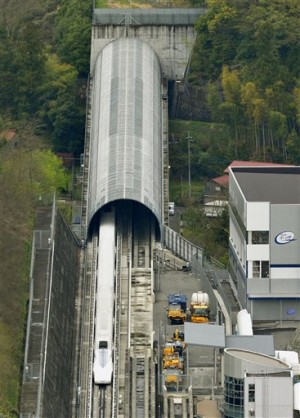Japan’s maglev train breaks own speed record at 603 kph
TOKYO — A Japanese maglev that is the fastest passenger train in the world has broken its own speed record.
Operator JR Central said the train reached 603 kilometers per hour (375 miles per hour) in a test run on Tuesday, surpassing its previous record of 361 mph (581 kph) set in 2003. The train traveled for just over a mile (1.8 kilometers) at a speed exceeding 600 kph (373 mph).

A Japanese maglev train that is the fastest passenger train in the world runs on the Maglev Test Line in Tsuru, about 80 kilometers (50 miles) west of Tokyo Tuesday, April 21, 2015. Operator JR Central said the train reached 603 kilometers per hour (375 miles per hour) in the test run on Tuesday, surpassing its previous record of 361 mph (581 kph) set in 2003. (Junko Ozaki/Kyodo News via AP)
Japan’s high-speed rail services are among the most advanced in the world, with hundreds of trains running each day with minimal delays. However, unlike regular shinkansen or “bullet trains” that run on steel rails, magnetic levitation trains hover above rails, suspended by powerful magnets.
The Maglev Test Line, near Mount Fuji about 80 kilometers (50 miles) west of Tokyo, is developing technology for use on a future 410-kilometer (250-mile) link that will reduce travel time between Tokyo and Osaka to just over an hour. The current minimum by bullet train is nearly three hours.
The maglev trains, begun as a project of Japan Airlines and the national railways with government support, have undergone decades of testing. Construction of the Tokyo-Osaka link, which is expected to cost more than 9 trillion yen ($76 billion), began in 2014.
The line, which will mostly run under mountains, is due to begin operations in the late 2020s. A similar system operates in Shanghai, linking its airport in the seaside suburbs of Pudong to the city’s subway system. TVJ
RELATED STORIES
Japan’s Shinkansen bullet train turns 50
Japan to go ahead with maglev train